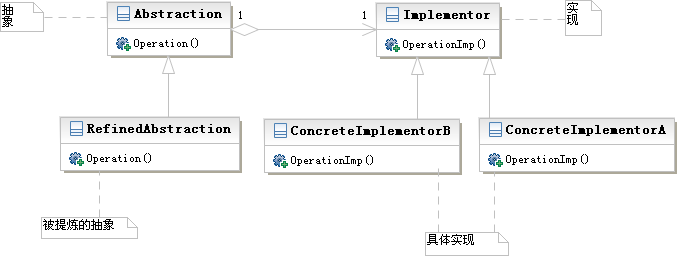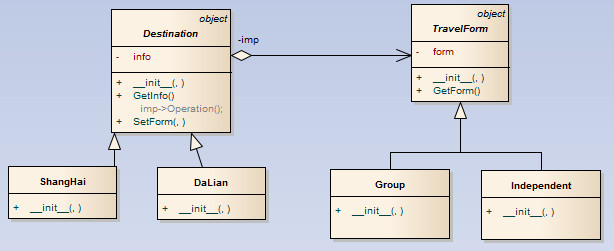实例解析Python设计模式编程之桥接模式的运用
2016-03-02 11:50
936 查看
我们先来看一个例子:
#encoding=utf-8
#
#by panda
#桥接模式
def printInfo(info):
print unicode(info, 'utf-8').encode('gbk')
#抽象类:手机品牌
class HandsetBrand():
soft = None
def SetHandsetSoft(self, soft):
self.soft = soft
def Run(self):
pass
#具体抽象类:手机品牌1
class HandsetBrand1(HandsetBrand):
def Run(self):
printInfo('手机品牌1:')
self.soft.Run()
#具体抽象类:手机品牌2
class HandsetBrand2(HandsetBrand):
def Run(self):
printInfo('手机品牌2:')
self.soft.Run()
#功能类:手机软件
class HandsetSoft():
def Run(self):
pass
#具体功能类:游戏
class HandsetGame(HandsetSoft):
def Run(self):
printInfo('运行手机游戏')
#具体功能类:通讯录
class HandsetAddressList(HandsetSoft):
def Run(self):
printInfo('运行手机通信录')
def clientUI():
h1 = HandsetBrand1()
h1.SetHandsetSoft(HandsetAddressList())
h1.Run()
h1.SetHandsetSoft(HandsetGame())
h1.Run()
h2 = HandsetBrand2()
h2.SetHandsetSoft(HandsetAddressList())
h2.Run()
h2.SetHandsetSoft(HandsetGame())
h2.Run()
return
if __name__ == '__main__':
clientUI();
可以总结出类图是这样的:

所以,桥接模式的概念在于将系统抽象部分与它的实现部分分离,使它们可以独立地变化。
由于目标系统存在多个角度的分类,每一种分类都会有多种变化,那么就可以把多角度分离出来,让它们独立变化,减少它们之间的耦合。
下面我们再来看一个实例:
基本原理请参考相关书籍,这里直接给实例
假期旅游 从目的地角度可以分为 上海和大连,从方式角度可以分为跟团和独体
桥接模式把这两种分类连接起来可以进行选择。
类图:

# -*- coding: utf-8 -*- ####################################################### # # tour.py # Python implementation of the Class DaLian # Generated by Enterprise Architect # Created on: 11-十二月-2012 16:53:52 # ####################################################### from __future__ import division from __future__ import print_function from __future__ import unicode_literals from future_builtins import * class TravelForm(object): """This class defines the interface for implementation classes. """ def __init__(self, form="stay at home"): self.form=form pass def GetForm(self): return self.form pass pass class Group(TravelForm): """This class implements the Implementor interface and defines its concrete implementation. """ def __init__(self, form="by group"): super(Group,self).__init__(form) pass pass class Independent(TravelForm): """This class implements the Implementor interface and defines its concrete implementation. """ def __init__(self, form="by myself"): super(Independent,self).__init__(form) pass class Destination(object): """This class (a) defines the abstraction's interface, and (b) maintains a reference to an object of type Implementor. """ m_TravelForm= TravelForm() def __init__(self, info): self.info=info pass def GetInfo(self): # imp->Operation(); return print(self.info + " " +self.form.GetForm()) pass def SetForm(self, form): self.form=form pass class DaLian(Destination): """This class extends the interface defined by Abstraction. """ def __init__(self, info="Go to DaLian "): super(DaLian,self).__init__(info) pass class ShangHai(Destination): """This class extends the interface defined by Abstraction. """ def __init__(self, info="Go to ShangHai"): super(ShangHai,self).__init__(info) pass #客户端 if(__name__=="__main__"): destination=ShangHai() destination.SetForm(Group()) destination.GetInfo() destination=DaLian() destination.SetForm(Independent()) destination.GetInfo()
运行结果

您可能感兴趣的文章:
相关文章推荐
- Python动态类型的学习---引用的理解
- Python3写爬虫(四)多线程实现数据爬取
- 垃圾邮件过滤器 python简单实现
- 下载并遍历 names.txt 文件,输出长度最长的回文人名。
- install and upgrade scrapy
- Scrapy的架构介绍
- Centos6 编译安装Python
- PropertyChangeListener简单理解
- 使用Python生成Excel格式的图片
- 让Python文件也可以当bat文件运行
- [Python]推算数独
- Python中zip()函数用法举例
- Python中map()函数浅析
- 什么是设计模式
- 设计模式之创建型模式 - 特别的变量问题
- Python将excel导入到mysql中
- 七、设计模式——装饰模式
- 设计模式总结
